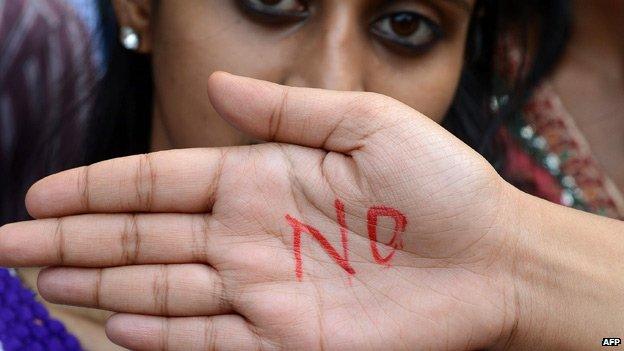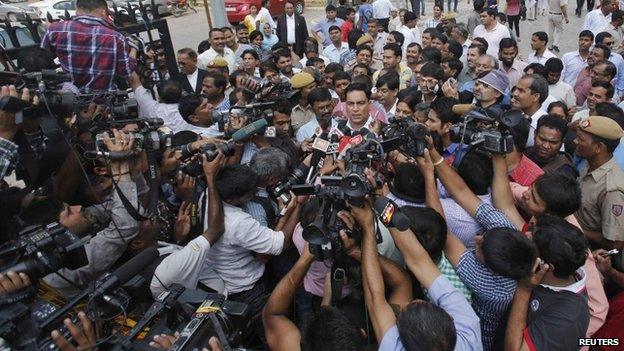India's code of silence over sexual abuse
- Published

As four men are sentenced to death for gang-raping and murdering a student in Delhi, it's encouraging that Indians are discussing how to make cities safer for women. But there is one topic - sexual abuse in the home - on which people remain silent.
I do not have many particularly vivid memories of my early childhood but the images of sexual abuse never go away.
I was barely seven years old, living in a typically large middle-class family with five siblings and numerous other relatives sharing a two-bedroom flat with a terrace.
My mother, a housewife, was always busy with the business of running such a big family on very limited resources. My father had so much to do just to feed all of us.
I loved being a part of this huge family. It gave me a strong sense of home - but it also made me an easy prey for sexual abuse.
Distant relatives and cousins kept coming and going through the family home. Being the youngest girl in the family, I was "loved" by them.
These love sessions would happen only when I was alone with one of them.
I hated it but, like many others in the same situation, I was too petrified to talk about it.
Getting rubbed, touched, kissed or being locked in bathrooms was the "love".
Even though the house was always full, I felt completely lonely and violated.
I remember the feeling very clearly and I remember when it all came to a head for me. I must have been around 10 years old.
After years of these regular assaults, one day I just broke down and started howling, sitting on the floor.
The offender was shocked and petrified. Why was I making a fuss after so long? What had changed?
I remember my elder sister hitting him hard until she tired from the effort. My parents immediately asked him to leave the family home.
And that was just about it. End of chapter. After that, we all carried on as if nothing had happened.
I am not sure what impact it had on me.
I did not start hating men. I grew up a happy child. I became independent. My parents must have felt that all was well with me and the world.
Later I began to wonder why they never reported the matter to the police. Why was "he" allowed to go scot-free?
Was my otherwise liberal, modern family worried about honour?
Family honour had never been a point of debate, but it seems in my case it became more important than facing up to what happened to me.
Or was it something else? Decades after the trauma, I have not yet asked my parents these questions. I still don't know the answers.
But talking to my sisters, cousins and friends, I discovered a sorority of the abused - so many of them suffered similarly harrowing experiences.
Experiences of abuse which were followed swiftly by experiences of silence, forgetting, and then pretending these things did not happen at all.
So when the news came in about the the four guilty men being handed the death penalty after being found guilty of the fatal gang rape of a student in Delhi last December, I again wondered: When will this omerta, this code of silence about abuse in Indian homes be broken?
The Nobel Laureate economist Amartya Sen famously talked about the argumentative Indian.
In a country of a million mutinies and conversations, this is very true. But, as one commentator recently said, we seem to be argumentative about everything except our own selves.
When will our families begin debating the roots and causes of sexual abuse of young girls - and boys - and women?

The rape of a young woman on a bus in New Delhi in December made headlines around the world
There is enough conversation happening about how to make women safer in public spaces. This is heartening and encouraging.
But while the case of the 23-year-old student was a random attack on a stranger, Indian Police records say that in more than 90% of the cases of sexual violence, the offenders are known to their victims.
So what is to be done?
Clearly homes and neighbourhoods are more unsafe than public spaces. This was certainly my own experience. This is where the change has to happen.
India needs to talk to itself more to make its homes safer for women. And to make sure that my six-year-old daughter's generation will not have to live with unanswered questions and silence.
How to listen to From Our Own Correspondent, external:
BBC Radio 4: Saturdays at 11:30 and some Thursdays at 11:00
Listen online or download the podcast.
BBC World Service: Short editions Monday-Friday - see World Service programme schedule.
You can follow the Magazine on Twitter, external and on Facebook, external.